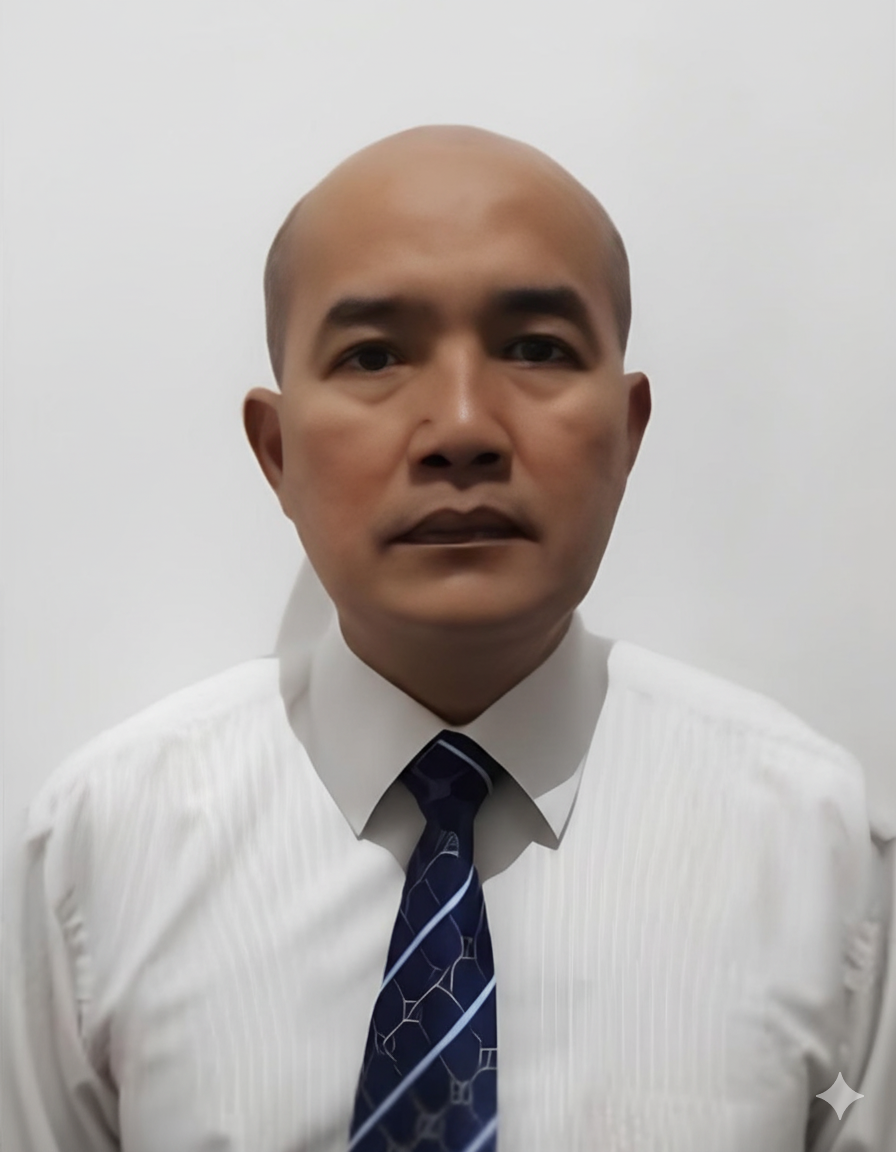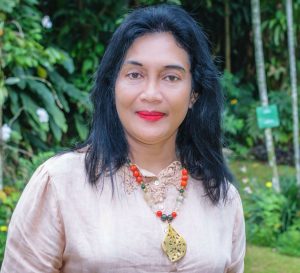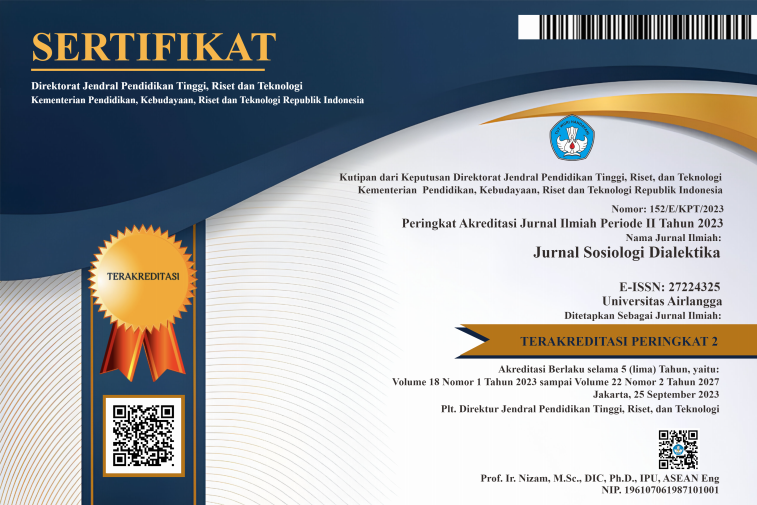Social construction of husband of female migrant workers on children's education
Downloads
The implementation of children's education in the family of female migrant workers (TKW) is slightly different from other families in which it relies in the hand of the fathers because the mothers are working abroad. Generally, children in such families are prone to problems either with the parents, in education, and/or in health due to the absence of the mother. This study utilizes Berger's social construction theory to analyze how children's education in such families are managed and conducted by the fathers. In order to do so, the research was designed as a qualitative research taking location in the village of Deyeng, in the district of Ringinrejo of Kediri known for its residents' high participation as TKW. Data were collected from in-depth interviews from informants selected using purposive sampling. Results show that, firstly, the fathers understand children's education as a shared responsibility with a bigger portion leaning to the mothers. This is due to perceived differences that the mothers tend to have stronger emotional attachment, perseverance, and patience to perform the task. Second, children's education are conducted by the fathers in the forms of teaching them to read, write, and draw; instilling norms of politeness, discipline, and religious values; and admitting the children to tutoring institutions and Islamic religious tutoring services. Third, the fathers adaptability to the mothers' leaving highly affects the process of children's education, either in terms of economic background of the family, the fathers' role in the children's education, the fathers' employment status, and difference in the children's education level.
Andayani B (2000) Profil keluarga anak-anak bermasalah. Jurnal Psikologi 27 (1):10-22.
Bachri B S (2010) Meyakinkan validitas data melalui triangulasi pada penelitian kualitatif. Jurnal Teknologi Pendidikan 10 (1):46-62.
Battistella G & Conaco MCG (1996) Impact of migration on the children left behind. Asian Migrant 9 (3):86-91.
Berger PL & Tomas L (1990) Tafsir Sosial Atas Kenyataan: Risalah Tentang Sosiologi Pengetahuan. Jakarta: LP3ES.
Berthelsen D, Walker S (2008) Parents' involvement in their children's education. Family matters (79):34.
Boushey H (2009) The New Breadwinners. The Shriver Report: A Woman Nation Changes Everything 158-64.
Chesley N (2011) Stay-at-home fathers and breadwinning mothers: Gender, couple dynamics, and social change. Gender & Society 25 (5):642-664.
Cinamon RG & Rich Y (2002) Gender differences in the importance of work and family roles: Implications for work–family conflict. Sex Roles 47 (11-12): 531-541.
Cotter DA, Hermsen JM & Vanneman R (2001) Women's work and working women: The demand for female labor. Gender & Society 15 (3):429-452.
David ME (1993) Parents, Gender & Education Reform. Blackwell Publishers.
Dunn MG, Rochlen AB & O'Brien KM (2013) Employee, mother, and partner: An exploratory investigation of working women with stay-at-home fathers. Journal of Career Development 40 (1):3-22.
Djamarah SB (2004) Pola Komunikasi Orang Tua Dan Anak Dalam Keluarga. Jakarta: Rineka Cipta.
Edwards R & Alldred P (2000) A typology of parental involvement in education centring on children and young people: Negotiating familialisation, institutionalisation and individualisation. British Journal of Sociology of Education 21 (3):435-455.
Graham E, Jordan LP, Yeoh BS, Lam T, Asis M & Su-Kamdi (2012) Transnational families and the family nexus: perspectives of Indonesian and Filipino children left behind by migrant parent(s). Environment and Planning 44 (4):793-815.
Goode WJ (1983) Sosiologi Keluarga. Jakarta: Bina Aksara.
Hidayat DR (2016) Pencegahan TKI kembali ke luar negeri melalui pelatihan untuk dapat berwirausaha. Sarwahita 13 (1):34-39.
Hugo G (2002) Effects of international migration on the family in Indonesia. Asian and Pacific Migration Journal 11 (1):13-46.
Kakepoto H, Brohi AA & Jariko GA (2012) Impact of social change upon family as social institution with special focus on Pakistan: A sociological analysis. International Research Journal of Arts & Humanities (IRJAH) 40 (40).
Little J (1987) Gender relations in rural areas: the importance of women's domestic role. Journal of Rural Studies 3 (4):335-342.
Moleong LJ (2005) Metodelogi Penelitian Kualitatif: Edisi Refisi. PT Remaja.
Poloma MM (2010) Sosiologi Kontemporer. Jakarta: Rajawali Press.
Prihatin SD (2007) Potret buram perlindungan Tenaga Kerja Indonesia (TKI). Jurnal Ilmu Sosial dan Ilmu Politik 10 (3):325-342.
Raharto A (2007) Indonesian labour migration: issues and challenges. International Journal on Multicultural Societies 9 (2):219-235.
Riyani NP (2015) Peran Ayah dalam Pengasuhan Anak terhadap Pencapaian Pendidikan Anak di Keluarga TKW. Makalah Kolokium.
Silvey R (2006) Consuming the transnational family: Indonesian migrant domestic workers to Saudi Arabia. Global Networks 6 (1):23-40.
Silvey R (2007) Mobilizing piety: Gendered morality and Indonesian–Saudi transnational migration. Mobilities 2 (2):219-229.
Suparlan P (2014) Paradigma Naturalistik dalam Penelitian Pendidikan: Pendekatan Kualitatif dan Penggunaannya. Antropologi Indonesia.
Useem EL (1992) Middle schools and math groups: Parents' involvement in children's placement. Sociology of Education:263-279.
Waite LJ (2000) The family as a social organization: Key ideas for the twenty-first century. Contemporary Sociology 29 (3):463-469.
Yazid S (2016) Indonesian Labour Migration: Identifying the Women.
Yoga DS, Suarmini NW & Prabowo S (2015) Peran keluarga sangat penting dalam pendidikan mental, karakter anak serta budi pekerti anak. Jurnal Sosial Humaniora 8 (1):46-54.
1. Copyright of this journal is possession of Editorial Board and Journal Manager, by the knowledge of author, whilst the moral right of the publication belongs to the author.
2. Legal formal aspect of journal publication accessibility refers to Creative Commons Attribution-NonCommercial-ShareAlike (CC BY-NC-SA), implies that publication can be used for non-commercial purposes in its original form (cannot be modified).
3. Every publications (printed/electronic) are open access for educational purposes, research, and library. Other that the aims mentioned above, editorial board is not responsible for copyright violation.















